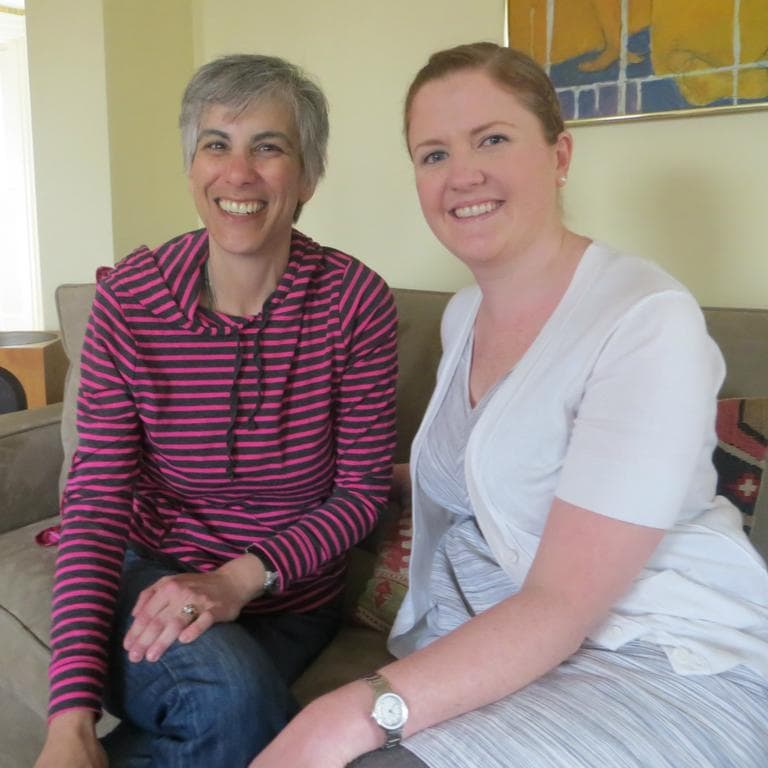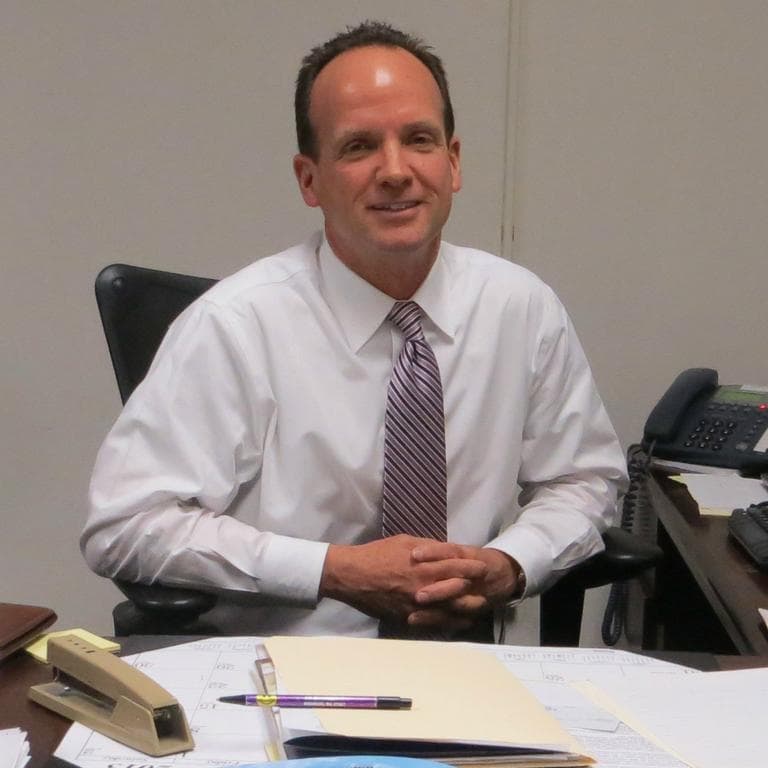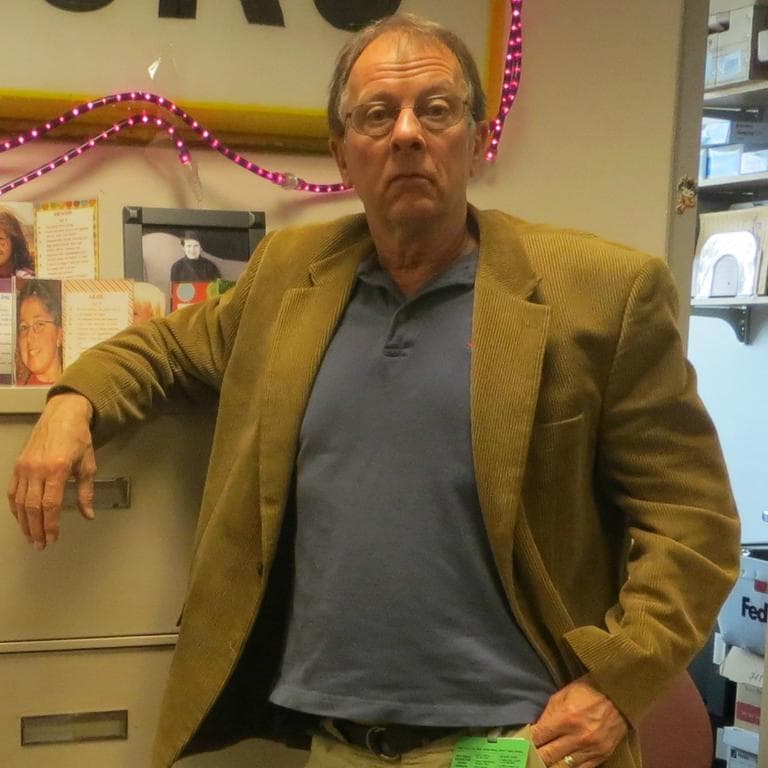Advertisement
Sequester Hits Mass. Medical Industry On Multiple Fronts
The Budget Control Act of 2011, better known as sequestration, has been law for more than a month now. And for months we've been reporting on the ripple effects the automatic federal budget cuts are having — or will have — in Massachusetts.
The medical industry in the state is being hit not just on the research side, but also on the patient care side.
The Cost Of A Brain Tumor

Dr. Lauren Farber is a pediatrician with a thriving medical practice. Her husband is a lawyer, and they with their two children live in a stately home in Wellesley.
For Farber, life doesn't get as good as this — or as bad. She has glioblastoma, or GBM, one of the most advanced kinds of brain tumors.
Farber was diagnosed not long after Sen. Ted Kennedy died from the same cancer. GBM is the most common, fastest spreading and deadliest brain cancer, with 22,000 Americans diagnosed annually. There is no cure.
Kennedy was an average GBM patient: He died 15 months after diagnosis. So far, Farber is beating the odds. She's going on four years, but — like so much about the cancer — no one knows why.
"I had several surgeries to remove the tumor, and I spent the next six months recovering, and then I went back to work," Farber explained.
She underwent multiple rounds of chemotherapy and radiation as well as experimental treatments. Farber said she can't even imagine how much her treatment costs.
"I have no idea," she admitted. "I have good health insurance. But that's the scary thing about sequestration — what if someone who is not as lucky as me, the same diagnosis as me, but relies on something government-funded, and they can't get funding for their treatment? What do they do?"
Advertisement
Cuts In Medicare Hit Doctors
Patients who receive Medicaid aren't affected by the sequester at all. But for people who are covered by Medicare, what they do depends largely on what their doctors do.
Under sequestration, Medicare gets cut 2 percent. That might not sound like much, but it can be the difference between being treated or not.
Take the drug Temodar, the standard of care for brain tumor patients such as Farber. It costs $300-$500 for a single pill. Doctors buy and administer the medicine, and Medicare reimburses them 6 percent above their cost. But now that reimbursement will be significantly less — the sequester cuts are borne by doctors.
According to a recent survey by the American Society of Clinical Oncology, 74 percent of doctors polled said they were having trouble paying for chemotherapy drugs. And since the sequester, 15 percent have been turning away Medicare brain tumor patients entirely.
Less Funding For Medical Research

In Massachusetts, sequestration poses a double whammy when it comes to medicine.
"We're kind of being hit from both sides, both the clinical side, the patient-care side and the research side," said John Erwin, executive director of the Conference of Boston Teaching Hospitals whose members get sizable federal research grants from the National Institutes of Health.
"Our hospitals receive more than $1 billion in NIH funding," Erwin said. "When you look at the top five independent hospitals in the country that receive NIH funding, they're in Boston. We rank two in pure dollars, but by far number one per capita in NIH funding. So the sequestration has a huge impact on our hospitals and the state's life science industry in general."
Federal research funds are the life blood that nurtures more than 700 biotech and medical device companies in the state. Massachusetts gets about $2.5 billion a year in federal medical research funding, but the sequester is cutting that by 5 percent.
"And then it will be even more next year," Erwin noted. "They're expecting it to be 8 percent next year."
This is on top of 10 years of flat federal spending on medical research. In fact, if you account for inflation, the budget for the NIH — which is by far the largest source of medical research funding — has declined 20 percent since 2003.
So while Massachusetts has benefited disproportionately from federal spending on medical research, so too might the state be disproportionately hurt by the sequester.
Dr. Chuck Stiles, co-director of the brain cancer program at Dana-Farber Cancer Institute, has been gearing up for the sequester's impact.
"About 75 to 80 percent of the money to run a laboratory like this comes from the NIH — in particular, from the National Cancer Institute. It's expensive business; we're not cutting up frogs here," Stiles said.

Brain science not only doesn't come cheap, said Stiles, but federal funding is scarcer.
When he started out at Dana-Farber in 1976, the NIH approved 40 percent of the research proposals it received. Now it approves just 7 percent, and Stiles expects more cuts, even in the grants he has already received.
"The sequester takes a bad situation and makes it even worse. Now I can't pay 90 percent of a post-doctoral research fellow. We have to sustain their salaries so we rob from Peter to pay Paul — we take our supply budget, pull that into personnel," Stiles said. "And the other thing is recruiting young talent into the laboratory. This is not like flipping burgers here. We don't just put up a sign and bring somebody in off the street."
Stiles fears the U.S. runs the risk of losing a generation of scientists — a reverse brain drain, as foreign students and Americans who train here find funding overseas and move.
Patients In Limbo
But this is not just about careers or research funding and sequester cuts, Stiles said.
"This is about the patients. They're the ones being hit by this," he said. "I'm not dying from cancer right now. I don't have a GBM. This problem impacts people with GBMs."
Farber is one of those people. Her glioblastoma brain cancer is at bay but her life depends upon a miracle — or a medical breakthrough — which could be affected by the sequester.
"It's horrifying. It's scary," Farber said. On the deficit, she added, "It's hard to look into the future like that when you're facing down something that could kill you within a year or two. I appreciate that I have two kids. I want them to be able to go to college, to live life and get a mortgage and all that. On the other hand, I want to be around to see that, so it's just not up for grabs."
The U.S. government might not be able to afford the deficit, but Farber can't afford to wait for the sequester to end. This Sunday, she's taking part in the Boston Brain Tumor Bike Ride. So far she's raised almost $18,000. The money will go to the National Brain Tumor Society to fund basic research.
This program aired on May 17, 2013.
